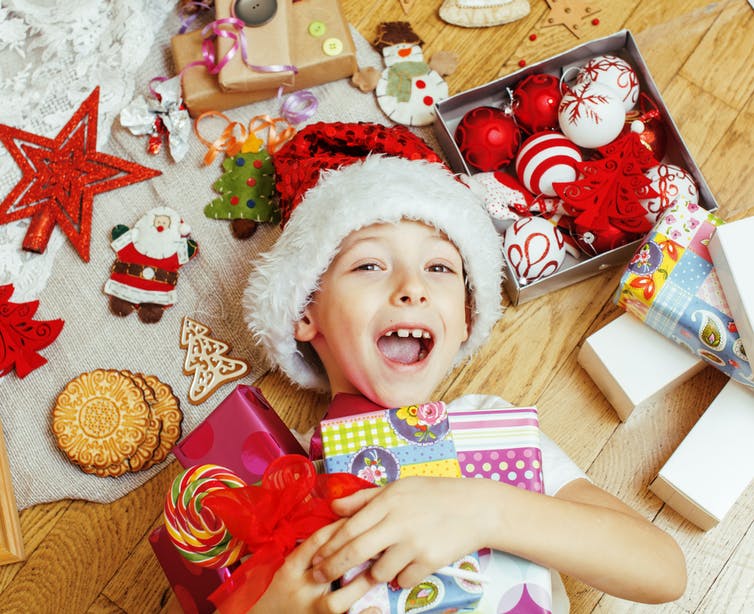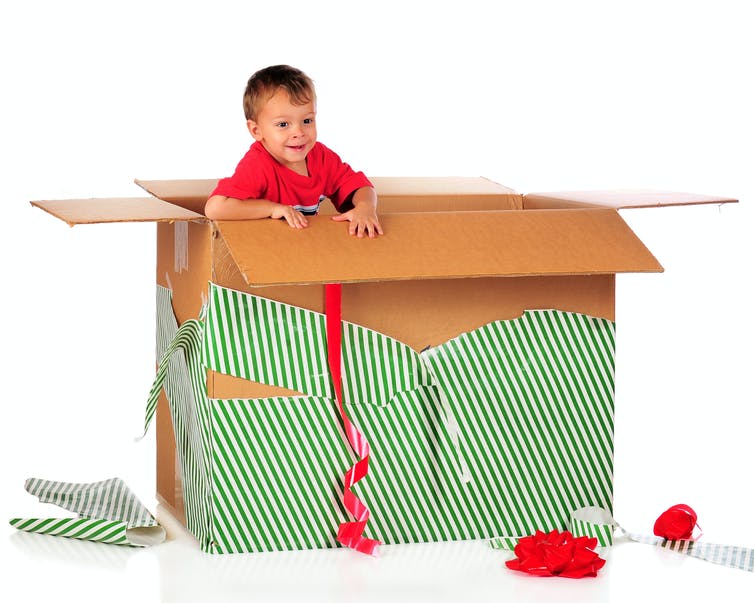Here’s why young children often prefer wrapping paper and boxes to actual presents

'OMG, I love this box!' shutterstock
We’ve all been there: you spend an unthinkable amount on a child’s toy – lulled by the promise that the interaction with the flashing lights and whooshing noises will excite, stimulate and educate our little people. Yet on the big day, we watch as our child’s interest in the toy quickly diminishes and the attraction of the discarded wrapping paper and packaging takes over.
We watch with confusion as our young children show us the real pleasures of Christmas – not their new shiny toy, but all that is destined for the recycling bin. And as they roll around on the floor in the wrapping paper and jump in and out of the boxes, we question our own sanity in spending ridiculous sums of money on a child who would have clearly preferred a cardboard box for Christmas.
But while our child’s preoccupation with screwed up wrapping paper and packaging may seem barmy to us adults, it is in fact just another way to play – and can help children to learn about themselves and the world around them.
The psychology of wrapping paper
At a very early age, children use play to drive their own learning. And when young children are allowed and actively encouraged to explore and follow their own interests, they develop understanding from their actions.
In recent years, neuroscientific studies have led to a greater appreciation of the importance of young children’s brain development. These studies have shown us that the first three years of a child’s life are a critical period for learning and development. This confirms a direct relationship between the quality of experiences young children gain and the growth and development of the brain.

‘Just look at this paper!’
Shutterstock
So, when children explore and experiment with objects such as boxes, paper and ribbons, they are using both their sensory and physical senses to extend their thinking.
“What is this and what can I do with it? Can I fit my hand inside? what else fits in?” – young children’s questioning minds are pivotal to their learning. And engagement in self-directed play helps to aid learning and supports the development of language as well as mathematical, scientific, creative, personal and social concepts.
The power of play
In today’s society, the power of play is frequently misunderstood and underestimated. Children these days have less time to “free play” given that so much of their playtime is structured or involves a parental onlooker.
But young children are physical beings, who gain sensory perceptions and feedback from the whole of their bodies – and these perceptions contribute to essential brain development. So seemingly meaningless actions such as twirling, jumping, rolling and messing around with objects can actually help children to learn about who they are and the world around them.
Through the sensory and physical exploration of the discarded boxes and Christmas wrapping paper, the foundations of learning and cognitive development are occurring. Children become sensitised and motivated to further their explorations, allowing more complex thoughts and understanding to develop.

Living the dream.
Shutterstock
So a young child who repeatedly fills and empties a box, climbs in and out, puts things in then tips them out, is not just making a mess. Instead they are exploring the “insideness” of the object – which helps them to understand concepts such as capacity, volume and space.
And with this in mind, rather than just filling the toy cupboard with a load of manufactured creations, it is important that young children are also able to make their own discoveries and to construct their own understanding, too.
So this Christmas, make sure your child has a chance to play with all the wrapping paper before it is neatly tidied up and disposed of. Because not only are you helping them to cultivate a desire to learn, you are also helping to develop their inquisitive resolve and creative expression.
You will also be allowing them the opportunity to strengthen the bits of their brain that are responsible for development – and this will help to ensure they have the foundations for future learning. And what could be a better gift than that?

Julie Brierley does not work for, consult, own shares in or receive funding from any company or organisation that would benefit from this article, and has disclosed no relevant affiliations beyond their academic appointment.







